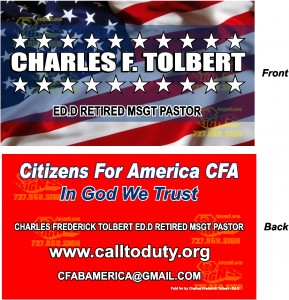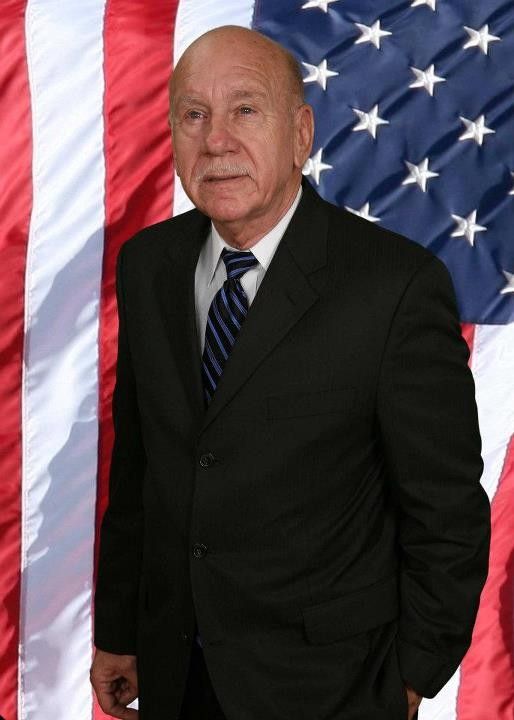Is the IRS in violation of the First Amendment?
Under the Internal Revenue Code, all section 501(c)(3) organizations are absolutely prohibited from directly or indirectly participating in, or intervening in, any political campaign on behalf of (or in opposition to) any candidate for elective public office.
The restriction is actually a law, not an amendment, and it isn’t exclusive to religious institutions.
The law says all such organizations “are absolutely prohibited from directly or indirectly participating in, or intervening in, any political campaign on behalf of (or in opposition to) any candidate for elective public office.” That includes contributions to political campaigns and any form of public statement for or against a candidate or group of candidates.
It takes Congress to remove the act
On religious television USA in 2017 Trump signed an executive order removing The Johnson Act that is an untrue statement
JOHNSON AMENDMENT
Charles Frederick Tolbert EdD300 E Oakland Park Blvd #132 Wilton Manors Florida 33334
www.calltoduty.org cfa@calltoduty.org561-398-9025
Is the IRS in violation of the First Amendment?
Can the federal government control churches through enforcement of a 501(c)(3) and the IRS?
Around the same time, the Free Speech Fairness Act was introduced in the House and Senate by Majority Whip Steve Scalise (R-La.), Representative Jody Hice (R-Ga.) and Senator James Lankford (R-Okla.) with the aim of repealing the Johnson Amendment. Only an act of Congress can repeal the legislation. President Trump signed the executive order against the Johnson amendment.
There has been widespread opposition from religious leaders too. In an open letter to Trump, 1,300 faith leaders opposed the executive order, including its possible weakening of the Johnson Amendment.
“The draft executive order flies in the face of that rich diversity by enshrining one religious perspective—on marriage, gender identity, health care and the role of houses of worship in partisan politics—into law, above all others,” the letter states. “This is neither what religious freedom means in the eyes of the law nor what religion itself means to millions of Americans of faith”.
“The religious freedom of individuals and organizations, including that of clergy and houses of worship, is already protected by the First Amendment and federal law,” the letter says.
Johnson amendment:
Which prevents churches and other tax-exempt religious organizations from endorsing or opposing political candidates.The Johnson Amendment is a provision in the U.S. tax code that prohibits all 501(c)(3) non-profit organizations from endorsing or opposing political candidates. Section 501(c)(3) organizations are the most common type of nonprofit organizations in the United States, ranging from charitable foundations to universities and churches. The amendment is named for then-Senator Lyndon B. Johnson of Texas.
Johnson Amendment
The Johnson Amendment refers to a change in the U.S. tax code made in 1954 which prohibited tax-exempt organizations from endorsing or opposing political candidates. Proposed by then-Senator Lyndon B. Johnson, the amendment affects churches and other nonprofit organizations with 501(c) tax exemptions.
The amendment was to a bill in the 83rd Congress, H.R. 8300, which was enacted into law as the Internal Revenue Code of 1954. The amendment was proposed by Senator Lyndon B. Johnson of Texas on July 2, 1954. (Johnson would later serve as President from 1963 to 1969.) The amendment was agreed to without any discussion or debate and included in Internal Revenue Code of 1954 (Aug. 16, 1954, ch. 736).[9] It was considered uncontroversial at the time, and continued to be included in the Internal Revenue Code of 1986 enacted during the Ronald Reagan administration.[10]
Johnson Amendment asserted that this regulation has “allowed the IRS to intimidate and censor churches and other nonprofit organizations.”
In summary the IRS in itself is an Illegal organization and should be closed and HR 25 should be passed.
In addition, the IRS amendment or any act or order by executive or Congress concerning religion is a violation of the First Amendment. The Supreme Court cannot hear any case in regards to religion. Based on the facts the first amendment states: “Congress shall make no law respecting an establishment of religion, or prohibiting the free exercise thereof; or abridging the freedom of speech, or of the press; or the right of the people peaceably to assemble, and to petition the government for a redress of grievances.” Since the IRS is controlling religion my 501(c)(3) document in itself is a violation of the First Amendment.
For further information written by Charles Frederick Tolbert DIVM, EdM, EdD
Retied Master Sergeant “MSGT” United States Army, Pastor
Www.calltoduty.org
Copy Editor, Vilet Dye…viletsvoice@yahoo.com
*Letter to Dr. Tolbert from Bill Wayland CP, Fl
To: Dr. Charles F Tolbert,
This is an interesting dilemma for those of faith. While at first glance, it may appear that the law preventing churches, i.e., actually the pastors, from espousing a point of view on political matters it follows because of the legal system. I have an audio tape on the issue of 501(c)(3)’s, and although I am not a lawyer, what is said on the tape makes some sense. It revolves around the issue of what a corporation is. For example, an UNINCORPORATED church has no problem in discussing political issues &
the merits thereof. An INCORPORATED church does have a big problem and it revolves around historical issues and sovereignty.
When you look up the definition of “sovereignty,” you find that the basic definition means “….TO BRING WITHIN THE BODY OF…” Which essentially means by incorporating, the church has inadvertently changed its SOVEREIGN from Jesus Christ to the government.
So legally, one cannot switch its allegiance from one Sovereign to another without some consequences–good or bad. This then gives
the government the right TO CONTROL THOSE UNDER ITS JURISDICTION AS TO WHAT THEY CAN SAY–i.e. you cannot go against your SOVEREIGN without suffering the consequences of your actions.
Historically, this was a real problem for the Church back in Roman times. The state Rome, told the church that if they wanted to continue their ministry, they would have to INCORPORATE. This in turn would allow them, the state, to control the churches. As such, most would NOT INCORPORATE and they became “outsiders, so to speak” and thus came the persecution of the Christians and the bloodbaths in the coliseum where they the Christians were fed to the lions. So, history is simply repeating itself as churches have forgotten their way.
The reason given for WHY churches should incorporate revolves around the income tax system. They the churches, are told that for their members to be able to deduct their contributions, i.e. their tithes, the church must be incorporated. As many Christians were put to death by the Romans for NOT INCORPORATING THEIR CHURCHES, it would make sense to do so. Unfortunately, a church DOES NOT HAVE TO INCORPORATE FOR ITS MEMBERS TO BE ABLE TO DEDUCT THEIR OFFERINGS. Churches fall under the same exclusion to taxation as ALL GOVERNMENT ENTITIES, e.g. school & other public, governmental, entities.
Also listen to “NON-PROFIT HANDCUFFS” by Peter Kershaw.
It is very informative and, as I mentioned, gives the historical background as to WHY the Christians of the day refused to incorporate their churches; discusses the issue in depth for a better understanding as to WHY the church forfeits its rights under Christ and substitutes the STATE as its sovereign.
Yours in Christ,
Bill Wayland, CP FL
352-751-3327
Www.cfabamerica.com
Copy Editor, Vilet Dye…viletsvoice@yahoo.com








